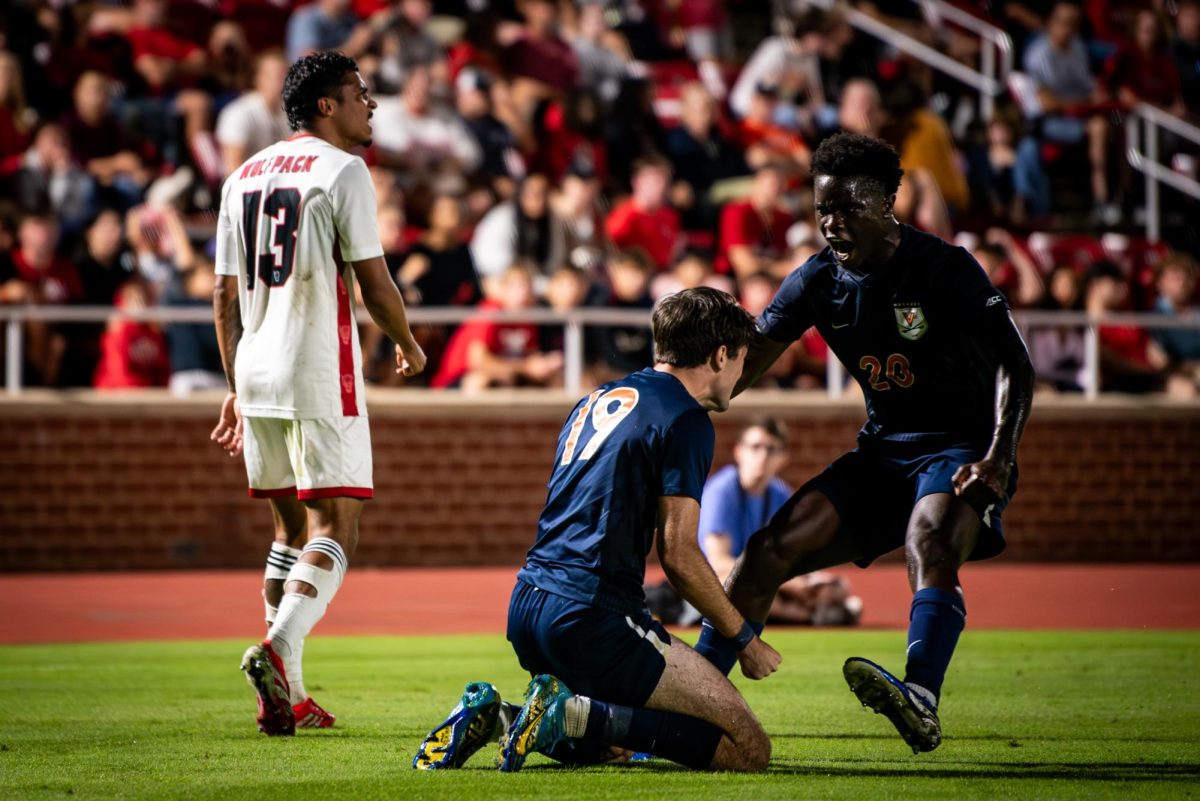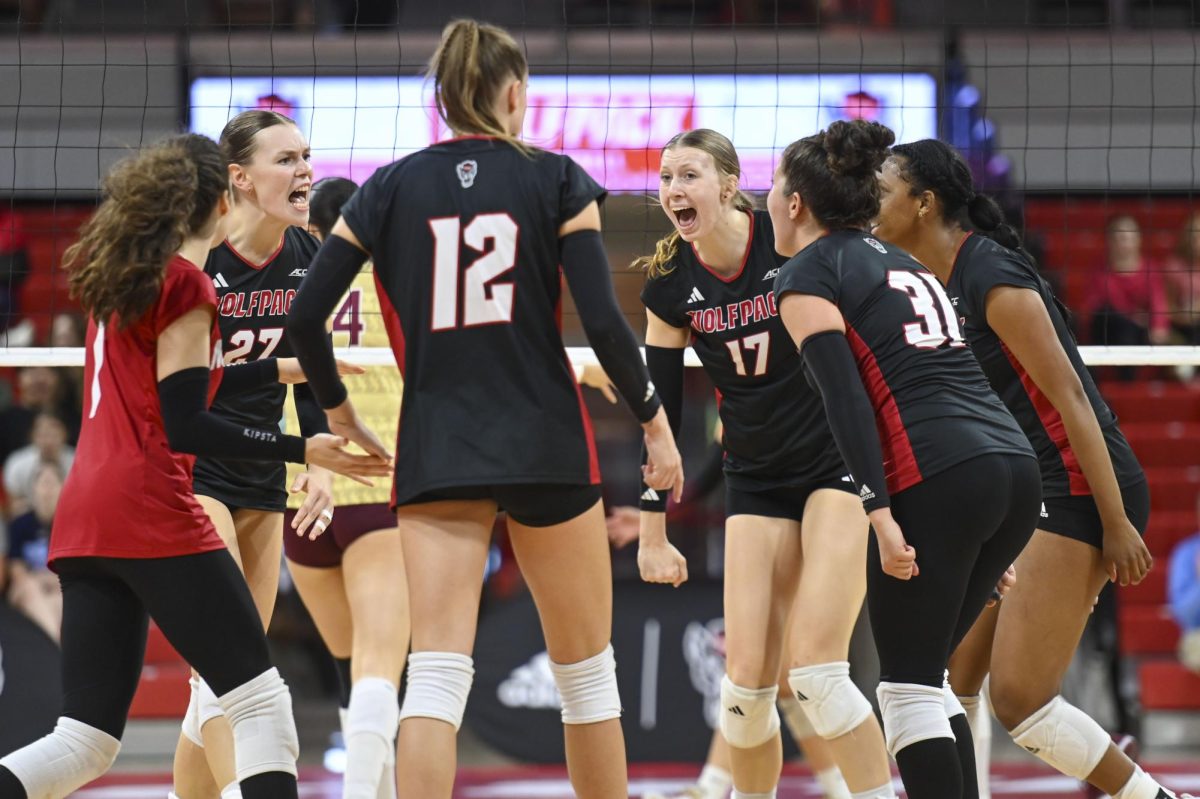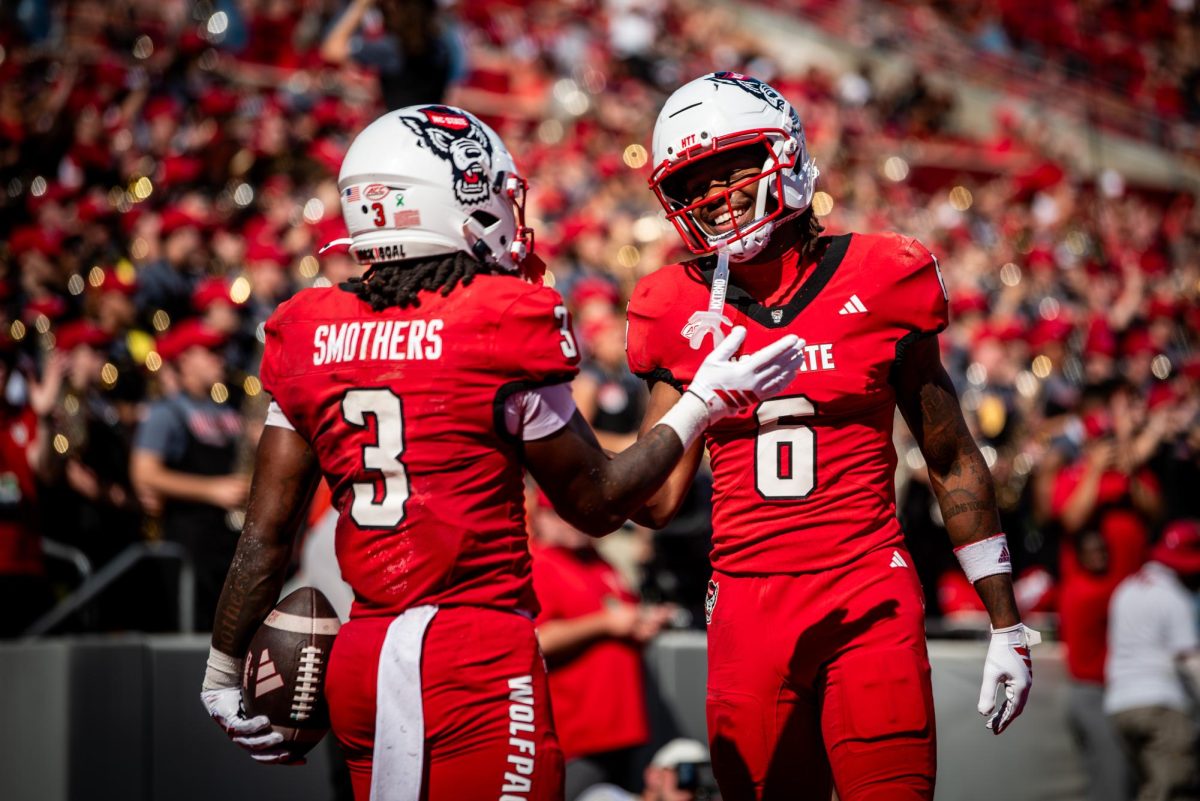Studio E is no bigger than a dorm room, yet has the distinct atmosphere of one. Papers lay scattered about the desks, multiple basketball and football schedules line the walls of the studio and several used mugs congregate in the center of the desks producing that all too familiar aroma of freshly brewed coffee grinds.
Two men work fervently around three extended microphones, moving back and forth from responding to tweets, to writing what seems to be shorthand that seldom people could understand in a notebook. Two televisions hang on the wall: one tuned into a broadcast of ESPN’s “College Football Live” while the other shows a press conference airing on the Golf Channel.
A large digital clock sits behind a large window displaying the time in hours, minutes and seconds in red numbers, slowly keeping track as the two men worked. A lone spotlight in the ceiling served as the lone source of illumination as it hung over the center of the room.
The large “On Air” light clicks on at 3 p.m., both men put their headphones on and approach the microphones and the daily broadcasting of the “Adam & Joe Show” begins.
Joe Ovies, along with his co-host Adam Gold, has been in charge of the aforementioned show for the last six years, but in order to find where his career in radio began, you have to look back just under two decades or so.
About 17 years ago, in the winter of 1998, Ovies signed up to be a DJ at 88.1 WKNC, the student-run radio station at NC State, during his freshman year.
“I’ve always had a fascination with radio,” Ovies said. “So I figured I’m at State, my freshman year, I’ll DJ. I like making mix tapes and playing music, so I’ll give it a shot.”
Ovies began doing news readings before moving on to operations director during his sophomore year. Then at the start of his junior year, an opportunity presented itself, and Ovies could not pass it up.
“The [general manager] at the time left school,” Ovies said. “So they needed a new GM and I applied for it, and I was the GM of WKNC from late ’99 through graduation in ’01.”
When reflecting on his tenure at WKNC, Ovies recalled fond memories he made at the student radio station in Raleigh. Highlighting former coworkers who’ve gone on to bigger and better things, Ovies said WKNC is “like any other club at State” as far as the networking benefits and experiences you come across.
“I got the opportunity to attend [the Collegiate Music Journalists] conference in New York,” Ovies said. “It was probably the first time, when I was in school, that I had to do something adult. You had to plan the trip, you had to get the registration and you had to manage a group of kids. Then you had to go to New York, go to those conferences, networking. It was like the first kind of ‘real-world adult stuff’ I did while at school.”
But the best part of working at WKNC was not the networking, or the trips or hosting the radio shows, but rather something many would have taken from granted.
“Just generally hanging out, you know?” Ovies said. “It was cool to hang out with like-minded kids, and listen to music, and talk about music, and do production and DJ and those types of things. We had a lot of fun.”
Ovies continued in the radio business after college for reasons that may seem unorthodox.
“I got into radio because it was a job,” Ovies said. “Seriously, part of radio and part of journalism is getting your foot in the door, I mean that’s that way with most jobs in this field.”
In college, Ovies started out as a computer science major, but then found himself changing to business management with a concentration in information technologies.
“When it was my senior year, I didn’t pursue any of the stuff I was in school for,” Ovies said. “I didn’t do any internships because I was so into the radio stuff I was doing.”
Eventually, Ovies decided to look for a job in the radio business, so he applied to the sports talk radio station that he was listening to at the time called 850 The Buzz.
He started out working Saturdays and Sundays running the boards at the station, screening calls, doing updates and picking up shifts where he could. He gained enough experience to the point when the next full-time job opened up in 2002, Ovies was hired full-time as the producer of his soon-to-be co-host Adam Gold’s show.
“I already kind of new the environment and knew what to do,” Ovies said. “And they said ‘All right, let’s make you full-time,’ and then other things come like new shows and opportunities.”
In 2005, the station needed a new morning show, and Ovies put himself in a position to host as he had been doing just that for a Saturday morning show. Eventually, Ovies was teamed up with Adam Gold, and they moved to ESPN 99.9 The Fan at Capital Broadcasting in 2009, and he’s been there ever since.
“It’s a challenge in the best possible way,” Gold said when asked what it’s like working with Ovies. “I’m serious, 10 years ago I was predictable, and I don’t think I’m predictable anymore. Working with Joe has kept me younger and the best possible thing for what we do. It’s a much fresher sounding show that’s ours.”
Gold did not stop there. He kept attributing the show’s success to Ovies and his incorporation of social media into their broadcasts.
“He’s the reason I’m active in social media,” Gold said. “Would I have gotten there eventually? Yeah, but I got there quicker because Joe got me into it to keep me up to date.”
The praise for Ovies goes far beyond the confines of the broadcasting booth. Their program director, Dennis Glasgow, has nothing but respect for Ovies and what he contributes to the station on a daily basis.
“He’s very fun to work with,” Glasgow said. “He’s professional, he works very hard on his craft, I think a lot of listeners think he flips on the mic at 2:59 and says what he wants to say, but he actually preps for hours and hours, day and night, going to games, reading articles and formulating his own opinion.”
Glasgow compared Ovies and his role in the show to that of other well-known, nationally syndicated sports talk radio hosts.
“All the great sports host like Jim Rome, Colin Cowherd, even the news guys like Rush Limbaugh, Sean Hannity or Howard Stern, they’re all prep monsters,” Glasgow said. “They’re talented cats, but unless you prep for a four/five-hour show you’re not going to be able to execute it daily.”
A big challenge for Ovies is trying to keep evolving as the landscape of the business is always changing, never staying put for longer than just a couple years. He even noticed how much it has changed since his days at State listening to sports talk.
“It used to be one host, one voice, one topic for an hour trying to elicit phone calls,” Ovies said. “It was also kind of like guy-talk radio. So in 15 years, it’s gotten away from that because the way ratings are taken and the way people listen to the show.”
Despite the ever-evolving business, Ovies is always up for the challenge as he continues to try and keep listeners tuned in to hear his takes on the day’s top sports stories.
“Sports talk radio has evolved into more like TV,” Ovies said. “You only have people’s attentions for about five minutes, so if you don’t grab their attention for five minutes, they’re gone.”
But when it boils down to the best part of his job, well, that is an easy question for Ovies to answer.
“I’m pretty lucky to just shoot the shit about sports for four hours a day,” Ovies said. “I mean it’s still work, but it’s not like work,work; it’s much more enjoyable than that, and I’d take that over a desk job any day of the week.”




